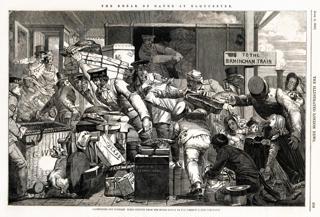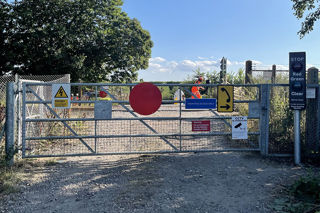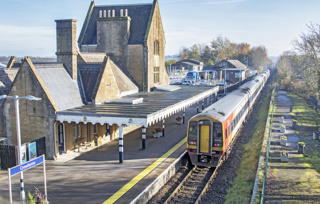The arrival last July of the new Labour government heralded an even more interventionist approach to the railways.
Nationalisation is the medium-term objective, followed by integration of track and train.
The arrival last July of the new Labour government heralded an even more interventionist approach to the railways.
Nationalisation is the medium-term objective, followed by integration of track and train.
And Labour’s vision for Great British Railways (GBR) has seen a shift in its purpose from a ‘guiding mind’ to a ‘directing mind’.
All this has led to the long-awaited consultation on the Rail Reform Bill. But does the consultation set out a sensible basis for the future of the railways, or are there too many ‘leaves on the line’?
The pros of rail reform are well-known. Better aligned incentives, with everyone delivering in the same direction for the benefit of the end user, is a good thing. Having a more powerful voice for the passenger is also a good thing, as the customer experience can often be lost in decision-making.
The reality, though, is that the consultation is a view of the railway from space - it isn’t close enough to the detail to know whether there is vegetation close to the railway, to understand if leaves are likely to be a problem at all.
For a consultation of such strategic importance, regarding a key manifesto commitment, there is a remarkable lack of detail.
It is an ambitious plan, yet heavy on platitudes and light on specifics. It risks putting too much power and responsibility in the hands of GBR, and relies too much on individuals doing the right thing.
This could lead to unintended consequences down the line when personalities change.
The consultation advocates GBR adopting a whole-system approach across track and train, allowing it to make investment decisions on a whole-life basis that looks at the best outcomes for both user and taxpayer.
This is no doubt a good thing, as GBR can take a collaborative approach to decision-making for the railway and better balance the pros and cons of particular choices for the benefit of the railway as a whole.
Existing structures have not always facilitated whole-system thinking, and so this is likely to be a key benefit of rail reform.
However, this ‘consolidation’ of responsibilities within GBR will turn it into a behemoth, subsuming powers from Network Rail, and functions from the Department for Transport and nationalised train operators.
It will potentially give GBR significant powers to fulfil the brief of its expanded remit - and yet there does not seem to be clear accountability in place to ensure that GBR does not abuse its power.
This is of particular concern when looking at what sits inside and outside of GBR.
There are several operators which will not sit within GBR’s scope - freight, open access, and devolved services such as Merseyrail and Transport for London concessions.
Rolling stock will also sit outside, and there doesn’t appear to be any plans to bring that part of the industry within GBR, at a time when the Office of Rail and Road (ORR) is reportedly taking another look at the rolling stock leasing model and the profits earned by rolling stock companies.
For operators outside of the GBR family, the risks are not insignificant.
GBR will have responsibility for capacity allocation and charging, but this could expose non-GBR operators to increased costs of operating on the network, potentially undermining their business models.
Even if non-GBR operators were not exposed to further costs, the risk of simply being overlooked by virtue of being a non-GBR operator is substantial.
This concern is amplified when you consider that the ORR will have its power blunted, with a focus on safety and efficiency for the most part, in order “for GBR to have the space and authority to take access decisions on the best use of its network”.
These words from the consultation would suggest that the government thinks GBR should have untrammelled power.
Given that the ORR will be constrained by its soon-to-be narrow framework, its power to protect non-GBR operators will also be significantly constrained compared with the current system.
This risks poor outcomes for non-GBR users of the railway, who make up a significant proportion of the railway services operated on the network.
What does bringing together track and train in this fashion look like for the passenger?
It’s fair to say that potential passenger benefits form a key argument for reform in the consultation.
A proposal is to establish a new passenger watchdog - “a strong, independent voice speaking on their behalf and championing their interests”. It will advocate for passengers, drive up standards in all key decisions, and respond to consultations on GBR policies, strategies and business.
However, the consultation states that GBR should have “regard” to the views of the watchdog - a pretty low bar - without any seeming requirement to act on what the watchdog says.
On the face of it, this means that it will be seemingly toothless in the face of the megalopoly of the new GBR.
Obviously, this is still early days. There are options to give the new passenger watchdog some heft, perhaps with statutory provisions, but either way having a strong, empowered advocate will deliver better outcomes for both passenger and operator.
The need for rail reform is not disputed. However, given how long reform of the railways has been in the public discourse, and how it was a key plank of the Labour manifesto, it is disappointing that current thinking appears underdeveloped.
Of course, only a certain level of detail is needed for a Bill. But when the output of that Bill is the future framework of the railway, a degree of detail is critical.
Simplification is good. Ensuring the passenger voice is more clearly heard is positive. But the success of reform will ultimately be in the eyes of the end user. And while this consultation is well-intentioned, there is a long way to go before we can be confident about what will be delivered.
Login to continue reading
Or register with RAIL to keep up-to-date with the latest news, insight and opinion.


















Login to comment
Comments
No comments have been made yet.